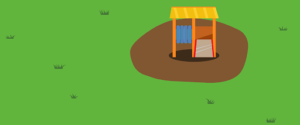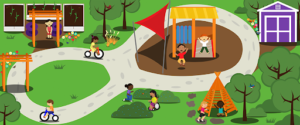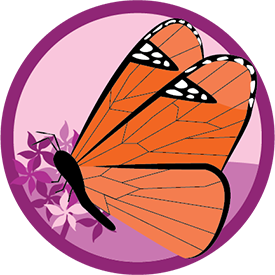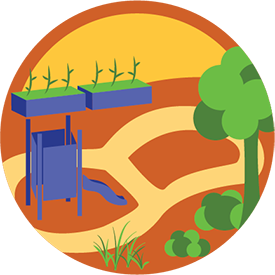Natural Learning Initiative Takes Education Outdoors with WolfWare Outreach
The Natural Learning Initiative (NLI) is reinventing what it means to play outside.
Today’s children grow up with a number of obstacles to outdoor play, from overly structured lifestyles to state-mandated curricula that neglect the outdoors. Additionally, many outdoor play spaces overlook nature — a powerful agent in children’s healthy development. NLI, a self-funded organization housed within NC State’s College of Design, works to solve these problems by helping communities create stimulating, natural places for play, outdoor learning and environmental education that recognize human dependence on the natural world.
With 20 years of research and implementation under their belts, NLI founders, Nilda Cosco, Ph.D. and Robin Moore, MCP, Hon. ASLA, are using WolfWare Outreach to teach educators and designers to promote, create and manage new types of nature-based learning environments. WolfWare Outreach is DELTA’s enterprise-level learning management system to offer non-credit, fee-based online courses. Cosco and Moore teach NLI’s two certificate programs in WolfWare Outreach to share their knowledge, fund future research and maximize the organization’s impact.
“There are so many people that want to know about nature-based play and learning spaces. We started thinking about how to transfer NLI’s knowledge to others … we knew we needed to multiply our efforts to share information about creating these high-quality outdoor environments for children’s health and well-being,” says NLI Director of Programs Nilda Cosco.
Certificate Programs for Professional Development
 Initially launched in 2017 with a successful pilot, each online, asynchronous certificate is now offered three times a year. The self-paced courses contain 24 hours of study and can be completed over 12 weeks. Both certificates conclude with either a capstone project or final knowledge assessment and course evaluation.
Initially launched in 2017 with a successful pilot, each online, asynchronous certificate is now offered three times a year. The self-paced courses contain 24 hours of study and can be completed over 12 weeks. Both certificates conclude with either a capstone project or final knowledge assessment and course evaluation.

Early Childhood Outdoor Learning Environments is recommended for early childhood professionals and others who want to improve outdoor play and learning environments. Participants learn how landscape design can promote active and healthy lifestyles and motivate learning in nature. The program continues to be popular with 120 enrollments in 2019’s summer section.
Designing Early Childhood Outdoor Environments is recommended for landscape design professionals, academic institutions teaching design-related disciplines and extension agent training programs. Participants learn how to create designs that apply outdoor learning concepts and best practices to encourage healthy child development. This program appeals to those with digital drafting experience and design practitioners.
Since the launch, participation has totaled 754 for the early childhood education professional course and 143 for the designer course.
“This is about any type of environment for young children, including parks, schools, gardens, zoos, domestic environments and more,” says Cosco.
The certificates are based on Cosco and Moore’s research, originally funded by grants from the National Institute of Environmental Health Sciences, the National Science Foundation, and the Robert Wood Johnson Foundation. The certificates were created with the support of the Texas Department of State Health Services (2016-2017) and the North Carolina Blue Cross and Blue Shield Foundation (2016- current). They now attract individual participants and those sponsored by organizations such as Nemours® Children’s Health System, the South Carolina Department of Health and Environmental Control, and the National Wildlife Federation’s Early Childhood Health Outdoors (ECHO) program.
“It’s a big step forward,” says Moore, NLI’s director and professor of landscape architecture. “Participants are really beginning to understand what this is about — helping children understand human dependency on the natural world. They recognize the importance of creating compelling spaces that pull kids outdoors to engage with nature.”
Educational Engagement
Online education allows NLI to reach their target audiences easily. Working professionals such as landscape architects, designers, teachers and caregivers can complete the program around their schedule and at their own pace.
Cosco and Moore support those who are returning to education with meaningful engagement through regular forum posts, discussing course topics and relevant natural events. They strive to increase the student’s return on investment with updates and “continuous quality improvement,” according to Moore.
“We try to bring people into nature as it is happening,” adds Cosco, referring to a recent weather event that was used as a topic for reflection in the class forum.
 During each certificate session, they twice offer optional Zoom or Skype sessions for participants to ask questions face to face. This not only builds engagement and boosts clarity for students, but helps Cosco and Moore learn what their students need to be successful.
During each certificate session, they twice offer optional Zoom or Skype sessions for participants to ask questions face to face. This not only builds engagement and boosts clarity for students, but helps Cosco and Moore learn what their students need to be successful.
“We also give a lot of instructions on how to write, how to put together a document, how to transform a Word document into a PDF –– all these things that are perhaps simple for us at the university level but are not that common in other environments,” says Cosco. 
An interdisciplinary group of NLI designers, researchers and program associates support Cosco and Moore in their mission. They assist with a variety of tasks from teaching, administration and certificate development to landscape design, data analysis and content production. The team deploys innovative learning strategies such as gamification,

achievement badges, and interactive video to enhance student learning. Cosco is familiar with optimizing online education –– she has taught LAR 221 (Environment and
Behavior for Designers) fully online for seven years. Last year, the course became Quality Matters-certified, a nationally recognized, standards-based program focused on continuous improvement of online and blended courses and programs.
Cosco and Moore plan to apply the same course quality concepts she learned in DELTA’s Course Quality Program to the NLI certificates.
“You never [stop] improving these certificates. The difference is amazing. I’m going to bring those standards into the certificate because they make it easier for the student,” says Cosco.
Forward Momentum
Cosco and Moore look forward to expanding NLI’s certificates in the near future. With WolfWare Outreach, they can easily scale the certificates while preserving the course material they’ve already developed. With DELTA’s help, Cosco and Moore feel prepared to take on more enrollments and diverse online professional offerings while maintaining high-quality programs.
“I learned the ropes of online instruction with a lot of assistance from DELTA,” says Cosco. “They help you with resources and related technical support and training. The level of their support is fantastic.”
As NLI paves new ground for children’s outdoor play, learning and engagement with the natural world, WolfWare Outreach will continue to deliver their message, preparing professionals with a knowledge base and motivation to put it into practice.
This post was originally published in DELTA News.


